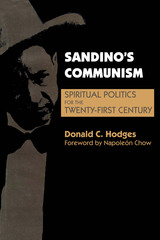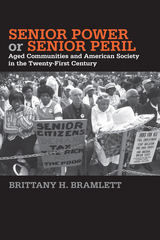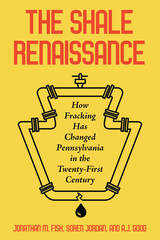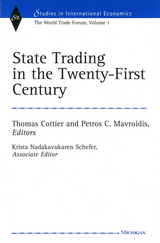6 start with S start with S

Drawing on previously unknown or unassimilated sources, Donald C. Hodges here presents an entirely new interpretation of the politics and philosophy of Augusto C. Sandino, the intellectual progenitor of Nicaragua's Sandinista revolution.
The first part of the book investigates the political sources of Sandino's thought in the works of Babeuf, Buonarroti, Blanqui, Proudhon, Bakunin, Most, Malatesta, Kropotkin, Ricardo Flores Magón, and Lenin—a mixed legacy of pre-Marxist and non-Marxist authoritarian and libertarian communists.
The second half of the study scrutinizes the philosophy of nature and history that Sandino made his own. Hodges delves deeply into this philosophy as the supreme and final expression of Sandino's communism and traces its sources in the Gnostic and millenarian occult undergrounds. This results in a rich study of the ways in which Sandino's revolutionary communism and communist spirituality intersect—a spiritual politics that Hodges presents as more realistic than the communism of Karl Marx.
While accepting the current wisdom that Sandino was a Nicaraguan liberal and social reformer, Hodges also makes a persuasive case that Sandino was first and foremost a communist, although neither of the Marxist nor anarchist variety. He argues that Sandino's eclectic communist spirituality was more of an asset than a liability for understanding the human condition, and that his spiritual politics promises to be more relevant than Marxism-Leninism for the twenty-first century. Indeed, Hodges believes that Sandino's holistic communism embraces both deep ecology and feminist spirituality—a finding that is sure to generate lively and productive debate.

In Senior Power or Senior Peril, Bramlett examines the assertions that the increasing number of older adult-concentrated communities across the United States form a growing bloc of senior power that will influence the redistribution of particularized welfare benefits to older adults at the expense of younger people. However, others suggest that political influence declines with old age. Bramlett uses interviews and on-site research at various senior communities to explore what qualities make an aged community politically unique, and the impact of the local aged context on residents' political knowledge, safety-net policy attitudes, efficacy, and political activity.
This path-breaking book identifies the political behaviors, attitudes, and political consciousness of both older and younger residents as it recounts the perceived and actual political power of seniors.
In the series The Social Logic of Politics, edited by Scott McClurg

Although a technique for hydraulic fracturing—more commonly known as fracking—was developed and implemented in the 1970s in Texas, fracking of the Marcellus Shale formation that stretches from West Virginia through Pennsylvania to New York did not begin in earnest until the twenty-first century. Unconventional natural gas production via fracking has ignited debate, challenged regulators, and added to the complexity of twenty-first-century natural resource management. Through a longitudinal study taken from 2000 to 2015, Jonathan M. Fisk, Soren Jordan, and A. J. Good examine how the management of natural resources functions relative to specific regulatory actions including inspections, identifying violations, and the use of specific regulatory tools. Ultimately, they find that factors as disparate as state policy goals, elected officials, the availability of data, inspectors, front-line staff, and the use of technology form a context that, in turn, shapes the use of specific regulatory tools and decisions.

Grounded in the intellectual legacies of two pioneering scholars of oral literature, Milman Parry (1902–1935) and Albert Lord (1912–1991), Singers and Tales in the Twenty-First Century gathers reflections on what the study of oral poetry might mean today across diverse poetic traditions, especially in light of ongoing global transformations that have dramatically reshaped and destabilized the very notion of tradition. This collection of essays spans disciplinary perspectives from Classics and comparative literature to musicology and anthropology. Oral traditions from ancient Greece and modern southeastern Europe, on which Parry and Lord focused, remain central in the present volume, but the book also offers important perspectives from regions beyond Europe, especially across Asia.
The title’s “singers and tales”—both in the plural, as opposed to an individual “singer of tales”—signals interest both in the polyphony of oral traditions and in the proliferation of methodologies and objects of study inspired by the work of Parry and Lord. Their notion of what has become known as the Oral-Formulaic Theory remains a necessary starting point—but only a starting point—for research on a whole range of verbal and musical arts.


Surrogate Warfare explores the emerging phenomenon of “surrogate warfare” in twenty-first century conflict. The popular notion of war is that it is fought en masse by the people of one side versus the other. But the reality today is that both state and non-state actors are increasingly looking to shift the burdens of war to surrogates. Surrogate warfare describes a patron's outsourcing of the strategic, operational, or tactical burdens of warfare, in whole or in part, to human and/or technological substitutes in order to minimize the costs of war. This phenomenon ranges from arming rebel groups, to the use of armed drones, to cyber propaganda. Krieg and Rickli bring old, related practices such as war by mercenary or proxy under this new overarching concept. Apart from analyzing the underlying sociopolitical drivers that trigger patrons to substitute or supplement military action, this book looks at the intrinsic trade-offs between substitutions and control that shapes the relationship between patron and surrogate. Surrogate Warfare will be essential reading for anyone studying contemporary conflict.
READERS
Browse our collection.
PUBLISHERS
See BiblioVault's publisher services.
STUDENT SERVICES
Files for college accessibility offices.
UChicago Accessibility Resources
home | accessibility | search | about | contact us
BiblioVault ® 2001 - 2024
The University of Chicago Press









